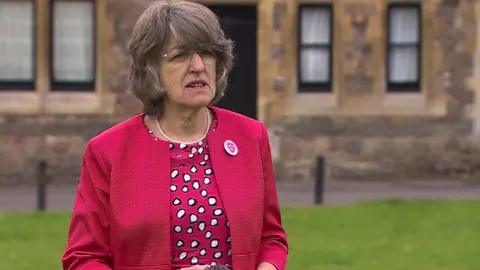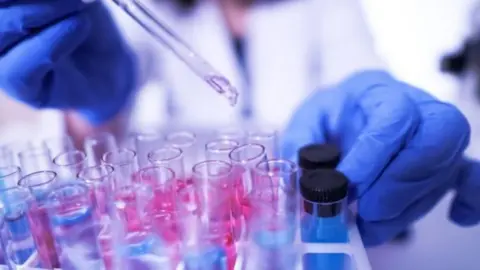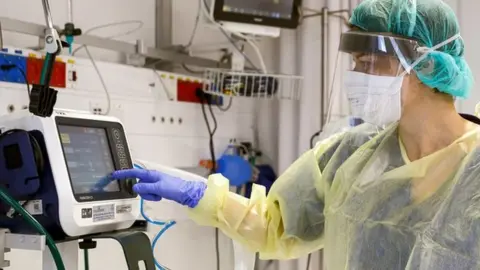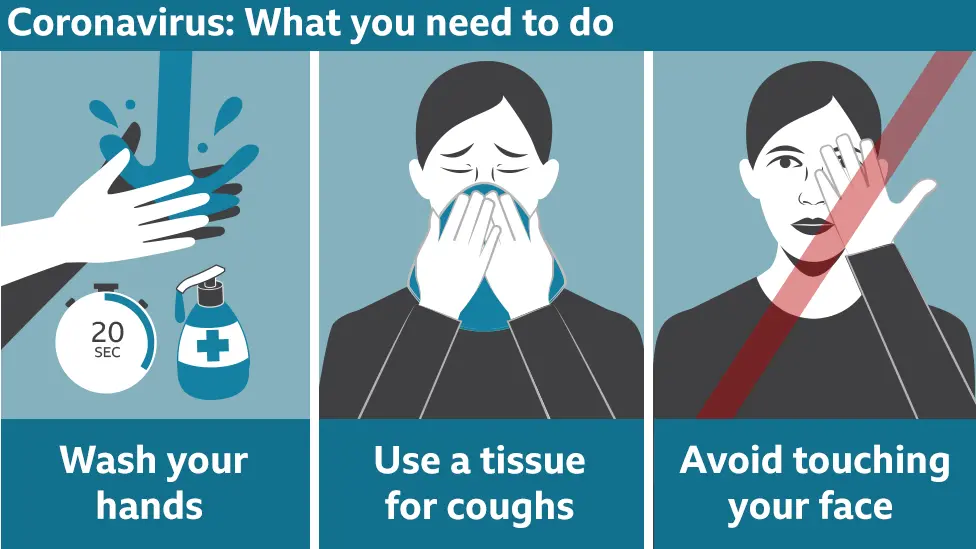Covid: Tackling coronavirus 'down to every one of us'
 BBC
BBCOne of Wales's most eminent doctors has said we are in "a precarious position" with almost two million people subject to new Covid restrictions.
Baroness Ilora Finlay said people needed to take personal responsibility to stop the spread of the virus.
She told BBC Wales that without quick action the NHS would become "completely overwhelmed".
Eleven of Wales' 22 council areas, including Cardiff and Swansea, are in local lockdown with tighter rules.
"I think that the Welsh Government have got a very difficult job," said Baroness Finlay, who is a Bevan Commissioner, a member of a group of independent experts that provides advice on health and care in Wales.
"We have to get the message across to everybody in the population that they have personal responsibility for breaking the chain of transmission," she said.
"It isn't that the government can do it, it isn't that some other body can do it - it's down to each and every one of us."

- SOCIAL DISTANCING: What are the rules now?
- SUPPORT BUBBLES: What are they and who can be in yours?
- SYMPTOMS: What are they and how to guard against them?
- LOOK-UP TOOL: How many cases in your area?

On Monday evening, Neath Port Talbot, Torfaen and Vale of Glamorgan joined eight other areas in lockdown in Wales.
Restrictions mean no travel outside council boundaries other than for work, education or medical emergencies, with no indoor mixing allowed and no alcohol sales after 22:00.
"This isn't about breaking rules," said Baroness Finlay.
"This is about caring about the people who you love, who matter to you and realising that if you take that virus home, or you give it to somebody who you're fond of and love, and they are desperately sick, you live with that guilt for the rest of your life.
"This isn't transient. People who are bereaved will live with this for the rest of their lives."
Blaenau Gwent now has the highest rate of infection in Wales - with 305 positive tests per 100,000 people - and is among the areas in local lockdown.
However, council chairwoman Amanda Moore said some people were still ignoring guidelines while others believed the virus was a "hoax".
"We have a small number of people who are carrying on as normal and ignore the advice," she told BBC Radio Wales.
"I'm hearing people say, 'why should I social distance? I haven't got it'. Some people still believe the virus is a hoax. It's really unbelievable what people are thinking.
"It's the ones with the mindset that it does not affect them. No matter what rules are put in place, there'll be people who will break them."
 Getty Images
Getty ImagesBaroness Finlay also said testing was "not a panacea" and following rules around social distancing and hand-washing were more important.
"I think that the problem with the message around testing is that bizarrely it can give you a false sense of security.
"People think if they've got a negative test, they're okay. It doesn't mean that.
"A negative test maybe means that you're at the beginning and you're just not producing enough virus for it to be picked up yet.
"Testing does not give you a free pass," she said.
 Getty Images
Getty ImagesBaroness Finlay said she was concerned NHS staff were "exhausted" after responding to the first wave of the pandemic.
"It isn't about paying them all, or going out and clapping, or whatever. It's about recognising that we must do all we can to flatten that curve, to not have that pressure," she said.
Her comments were echoed by an intensive care consultant who warned it could only take a few people's "bad behaviour" to "cripple" the NHS.
Dr Ami Jones of Aneurin Bevan University Health Board said: "Please do what you can to obey the rules because the NHS cannot cope with another big wave of covid, plus the usual winter pressures.
"It's very simple things - it's not going into people's houses, wearing face masks, washing your hands and having flu jabs.
"A few people's bad behaviour could absolutely cripple the NHS this year. Please don't be one of those people."
Allow X content?

As one of Wales' leading end-of-life care specialists, Baroness Finlay is calling for health organisations not to impose a blanket ban on families visiting due to coronavirus restrictions going forward.
During the peak it was not uncommon for next of kin be prevented from spending their final hours with their loved ones.
"I think we need to have a much more nuanced, gentle, compassionate approach to how we manage people who are dying and those who love them," she said.
"They want to be with them [at the end], they want to sit with them, of course they do.
"And I worry that we may have got the balance wrong and we need to get it right."

